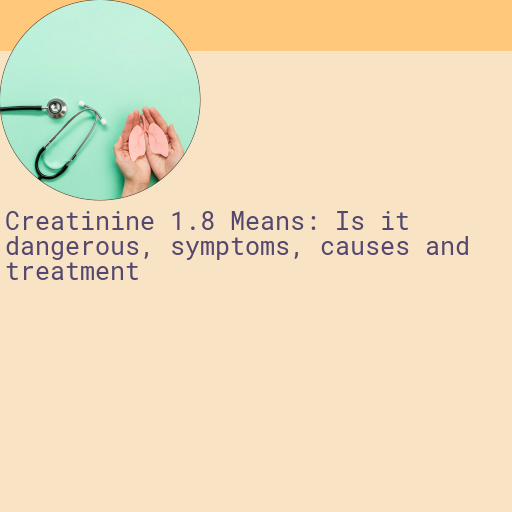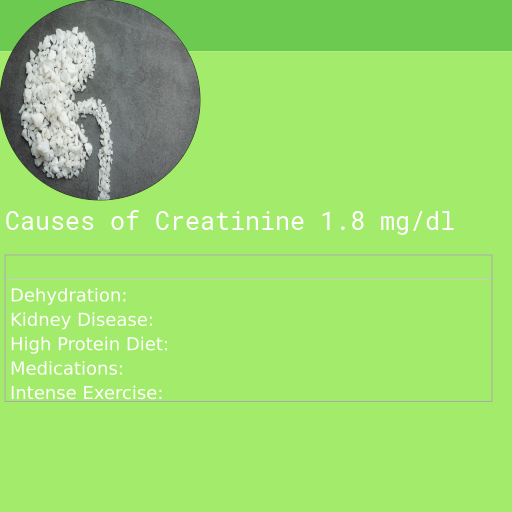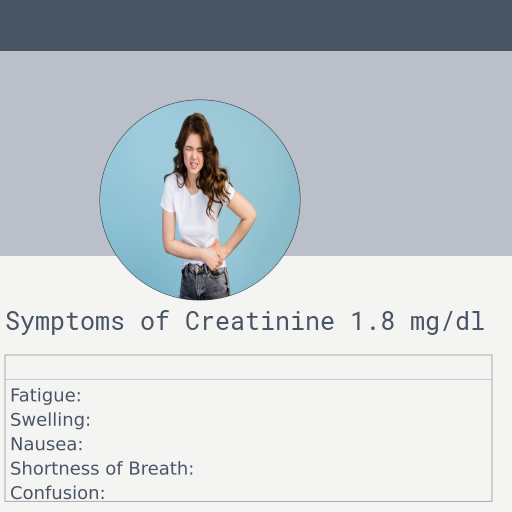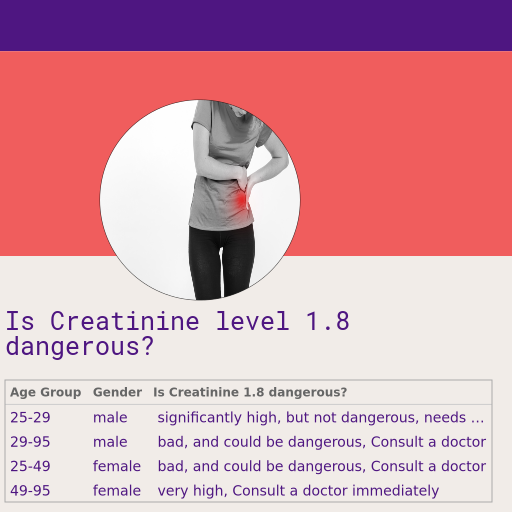Creatinine 1.8 : Is it Dangerous, Causes, Symptoms and More
Understanding the significance of a creatinine level of 1.8 is crucial for anyone concerned about their kidney health. Creatinine, a waste product produced by muscle metabolism, is typically filtered out of the blood by healthy kidneys. Elevated levels can be a red flag indicating potential issues with kidney function. In this blog, we will delve into the dangers associated with high creatinine levels, explore the causes behind this condition, identify common symptoms to watch out for, and discuss possible treatment options to manage and reduce elevated creatinine levels effectively.

What is Creatinine
Creatinine is a key byproduct of protein breakdown in muscles, acting as a significant indicator of kidney function. This waste product is filtered out of the blood by the kidneys and then excreted in the urine. Since creatinine has no use in the body, its levels in the blood can offer valuable insights into how well the kidneys are performing their essential filtration duties. Elevated levels may signal potential issues with kidney function, necessitating a closer look at underlying health conditions. Regular monitoring of creatinine can thus be crucial for maintaining overall health.
- Muscle Metabolism: Creatinine is a waste product formed from the normal wear and tear on muscles. As muscles use energy, creatinine is produced as a by-product.
- Meat Consumption: Eating large amounts of red meat or other sources of dietary protein can increase the levels of creatinine in the blood.
- Kidney Function: The kidneys filter out creatinine from the blood. Impaired kidney function can lead to increased levels of creatinine.
- Supplements: Some bodybuilding supplements contain creatine, which can convert to creatinine in the body.
- Dehydration: Lack of sufficient water can concentrate creatinine in the blood, leading to higher levels.
- Certain Medications: Some medications can affect kidney function or muscle metabolism, indirectly leading to increased creatinine levels.
- Medical Conditions: Conditions like rhabdomyolysis, where muscle tissue breaks down, can release large amounts of creatinine into the bloodstream.
Normal Range of Creatinine in Adults
The normal range of creatinine levels in adults varies slightly depending on factors such as age, gender, and muscle mass. Typically, the normal range for men is around 0.6 to 1.2 milligrams per deciliter (mg/dL) and for women, it is approximately 0.5 to 1.1 mg/dL. These values can be influenced by a person's diet, hydration status, and overall health. Maintaining creatinine levels within this range is crucial as elevated levels may indicate potential kidney issues or other underlying health concerns.
| Age Group | Creatinine Normal Range (mg/dL) |
|---|---|
| Infants (0-1 year) | 0.2 - 0.4 |
| Children (1-12 years) | 0.3 - 0.7 |
| Adolescents (13-18 years) | 0.5 - 1.0 |
| Adults (19-60 years) | 0.6 - 1.2 |
| Older Adults (60+ years) | 0.6 - 1.3 |
Causes of Creatinine 1.8
Elevated creatinine levels can be a signal of underlying health issues that may require medical attention. The causes of high creatinine are varied and can range from kidney disease or kidney infection to conditions like diabetes and high blood pressure. Other potential causes include dehydration, certain medications, and excessive protein intake. Understanding these causes is crucial for diagnosing and managing elevated creatinine levels effectively.
- Dehydration: Lack of sufficient fluids can lead to elevated creatinine levels.
- Kidney Disease: Chronic conditions affecting the kidneys can impair their function, resulting in high creatinine levels.
- High Protein Diet: Consuming excessive amounts of protein can temporarily raise creatinine levels.
- Medications: Certain drugs, such as nonsteroidal anti-inflammatory drugs (NSAIDs) and some antibiotics, can affect kidney function.
- Intense Exercise: Vigorous physical activity can cause a temporary spike in creatinine levels due to muscle breakdown.
- Diabetes: Poorly controlled blood sugar levels can damage the kidneys over time, leading to elevated creatinine.
- High Blood Pressure: Hypertension can strain the kidneys and impair their ability to filter waste, increasing creatinine levels.
- Urinary Tract Obstructions: Blockages in the urinary tract, such as kidney stones or tumors, can impede normal kidney function.

Symptoms of Creatinine 1.8
When creatinine levels rise above the normal range, it can be a signal that something is amiss with your kidney function. Elevated creatinine levels might not always present with obvious symptoms, but some individuals may experience signs such as fatigue, swelling in the extremities, shortness of breath, and changes in urination. It's crucial to pay attention to these symptoms, as they can indicate underlying health issues that require medical attention.
- Fatigue: Elevated creatinine levels can cause persistent tiredness and a feeling of weakness.
- Swelling: Noticeable swelling, especially in the hands, feet, or face, due to fluid retention.
- Nausea: A frequent feeling of nausea or even vomiting may indicate high creatinine levels.
- Shortness of Breath: Difficulty breathing or shortness of breath can be a symptom of impaired kidney function.
- Confusion: Mental confusion or difficulty concentrating can occur with elevated creatinine.
- High Blood Pressure: Elevated blood pressure is often associated with kidney issues and high creatinine levels.
- Reduced Urine Output: A noticeable decrease in urine production can be a sign of elevated creatinine.
- Itchy Skin: Persistent itching, often without a clear cause, can be a symptom linked to kidney problems.

Dangers of Creatinine 1.8
Creatinine is a waste product generated by muscle metabolism and is usually filtered out by the kidneys. While creatinine itself does not directly affect the body, elevated levels of creatinine can be a significant indicator of underlying health issues, particularly kidney failure. When kidneys are not functioning properly, they fail to remove creatinine and other waste products like urea from the blood, leading to harmful effects on the body. Elevated creatinine levels serve as a red flag for potential kidney damage or other medical conditions that require immediate attention. Understanding the implications of high creatinine levels is crucial for timely diagnosis and treatment.
- Kidneys: High creatinine levels can indicate kidney dysfunction or kidney disease, leading to reduced ability to filter waste from the blood.
- Heart: Elevated creatinine levels may be associated with cardiovascular diseases, potentially increasing the risk of heart attacks and hypertension.
- Liver: Impaired kidney function can cause an imbalance in electrolytes and toxins, which can negatively impact liver health.
- Muscles: High creatinine levels can be a sign of muscle breakdown or injury, leading to muscle weakness and pain.
- Brain: Elevated creatinine can lead to neurological issues such as confusion, agitation, and even seizures due to the accumulation of waste products.
- Lungs: Poor kidney function can cause fluid buildup in the body, leading to pulmonary edema and difficulty breathing.
- Digestive System: High creatinine levels may result in nausea, vomiting, and a loss of appetite, affecting overall nutrition and digestion.
- Immune System: Chronic kidney disease can weaken the immune system, making the body more susceptible to infections and illnesses.
Home remedies for Creatinine 1.8
Disclaimer: Elevated creatinine levels, such as a creatinine of 1.8, indicate potential kidney issues that require professional medical attention and cannot be treated at home. While basic supportive care such as staying hydrated, maintaining a balanced diet, and avoiding nephrotoxic substances like certain medications and alcohol can support kidney health, these measures alone are insufficient for treating elevated creatinine. It is crucial to consult a healthcare provider for a proper diagnosis and treatment plan.
- Stay Hydrated: Drinking plenty of water helps your kidneys function properly and can assist in maintaining creatinine levels.
- Reduce Protein Intake: Consuming less protein can lower the amount of waste your kidneys need to filter, easing their workload.
- Avoid Creatinine Supplements: Refrain from taking supplements that may increase creatinine levels, such as creatine.
- Monitor Blood Pressure: Keeping your blood pressure in check can help prevent further kidney damage.
- Limit Salt and Sodium: Reducing salt and sodium intake can decrease the strain on your kidneys, aiding in better kidney function.
Treatment for Creatinine 1.8
If your creatinine level is 1.8, seeking medical treatment by a doctor is essential. The primary goals of treatment are to stabilize kidney function, discontinue any harmful medications, and address underlying infections. By focusing on these objectives, healthcare professionals aim to prevent further damage to the kidneys and improve overall health outcomes. Early intervention and proper management are crucial in mitigating the risks associated with elevated creatinine levels.
- Hydration: Increasing fluid intake can help flush out creatinine through the kidneys, potentially lowering its levels.
- Medications: Doctors may prescribe specific medications to manage underlying conditions that contribute to elevated creatinine levels.
- Dietary Adjustments: Reducing the intake of protein-rich foods and incorporating more fruits and vegetables can help decrease creatinine levels.
- Dialysis: In severe cases of kidney dysfunction, dialysis may be required to remove waste products, including creatinine, from the bloodstream.
- Monitoring and Management: Regular monitoring of kidney function and managing contributing health issues like hypertension and diabetes are crucial for controlling creatinine levels.
GFR with Creatinine of 1.8
When discussing kidney health, it's crucial to introduce the concept of Glomerular Filtration Rate (GFR). GFR is a measure of how well your kidneys are filtering blood and removing waste. Unlike the absolute value of creatinine, which can vary based on factors like age, sex, and muscle mass, GFR provides a more comprehensive picture of kidney function by taking these variables into account. This makes GFR a more accurate indicator of kidney health, as it helps to identify potential issues before they become severe. Understanding your GFR can lead to earlier interventions and better management of kidney-related conditions.
| Grade | GFR (mL/min/1.73 m2) | Stage | Description |
|---|---|---|---|
| G1 | ≥ 90 | Normal or High | Normal kidney function but there may be some evidence of kidney disease. |
| G2 | 60-89 | Mildly Decreased | Mild decrease in kidney function, usually with some signs of kidney damage. |
| G3a | 45-59 | Mild to Moderate Decrease | Kidney function is reduced moderately, and there may be evidence of kidney damage. |
| G3b | 30-44 | Moderate to Severe Decrease | Significant reduction in kidney function, often accompanied by symptoms such as fatigue, swelling, and high blood pressure. |
| G4 | 15-29 | Severely Decreased | Severe reduction in kidney function, usually requiring preparation for renal replacement therapy. |
| G5 | < 15 | Kidney Failure | Very severe or end-stage kidney failure, requiring dialysis or a kidney transplant. |
What is my GFR for a creatinine of 1.8
| Age | Gender | GFR |
|---|---|---|
| 18 | male | 49.39 ml/m2 |
| 45 | male | 41.01 ml/m2 |
| 60 | male | 38.68 ml/m2 |
| 80 | male | 36.49 ml/m2 |
| 18 | female | 36.65 ml/m2 |
| 45 | female | 30.43 ml/m2 |
| 60 | female | 28.7 ml/m2 |
| 80 | female | 27.07 ml/m2 |
Table of danger posed by Creatinine 1.8 in male across different ages
| Age Group | Is Creatinne of 1.8 dangerous? |
|---|---|
| 25yrs - 29 yrs | significantly high, but not dangerous, needs attention |
| 29yrs - 95 yrs | bad, and could be dangerous, Consult a doctor |
Table of danger posed by Creatinine 1.8 in female across different ages
| Age Group | Is Creatinne of 1.8 dangerous? |
|---|---|
| 25yrs - 49 yrs | bad, and could be dangerous, Consult a doctor |
| 49yrs - 95 yrs | very high, Consult a doctor immediately |

Which other tests should be done for a creatinine value of 1.8?
In addition to monitoring creatinine levels, healthcare providers often recommend further diagnostic tests to gain a comprehensive view of kidney function and overall health. These tests include the assessment of electrolytes, such as sodium, potassium, and chloride, which are crucial for maintaining fluid balance and nerve function. A renal profile is another important set of tests that measure various aspects of kidney function, providing a detailed look at how well the kidneys are filtering blood. Additionally, blood gas levels can be evaluated to check for acid-base imbalances, which can be indicative of kidney issues or other metabolic disorders. By combining these tests, doctors can formulate a more accurate diagnosis and tailor treatment plans effectively.
- Electrolytes: This test measures the levels of key minerals like sodium, potassium, chloride, and bicarbonate in your blood. These electrolytes are crucial for maintaining fluid balance, nerve function, and muscle function.
- Renal Profile: A comprehensive renal profile assesses various markers like blood urea nitrogen (BUN), serum creatinine, and glomerular filtration rate (GFR) to evaluate kidney function and detect renal impairment.
- Blood Gas Levels: Blood gas analysis measures oxygen, carbon dioxide, and pH levels in your blood. This test is essential for assessing respiratory function and can help detect metabolic imbalances linked to kidney issues.
- HbA1c: Glycated hemoglobin (HbA1c) provides an average blood sugar level over the past 2-3 months. Elevated levels can indicate poor blood sugar control, which can exacerbate kidney problems.
- LDH: Lactate dehydrogenase (LDH) is an enzyme found in many body tissues, including the kidneys. Elevated LDH levels can indicate tissue damage or disease, including kidney damage.
- Urea: Blood urea nitrogen (BUN) levels can provide insight into how well your kidneys are filtering waste from your blood. High levels may indicate poor kidney function.
- Liver Enzymes: Tests for liver enzymes like ALT and AST help evaluate liver function. Since liver and kidney functions are interconnected, abnormalities in liver enzymes can offer additional insights into overall health.

 By: Dr.Bhargav Raut
By: Dr.Bhargav Raut